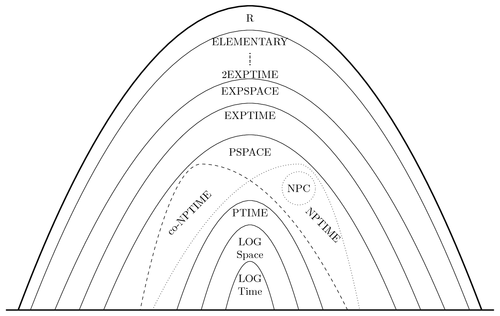Based on the book "Computational Complexity" by C. H. Papadimitrio

Edit and compile if you like:
% Author: Sebastian Sardina
\documentclass[a4paper,10pt]{article}
\usepackage{tikz}
\usepackage[active,tightpage]{preview}
\PreviewEnvironment{tikzpicture}
\setlength\PreviewBorder{5pt}%
\begin{document}
\begin{tikzpicture}
\pgftransformscale{.8}
%%% HELP LINES - uncomment to design/extend
% \draw[step=1cm,gray,very thin] (-10,0) grid (10,12);
% \node at (0,0) {\textbf{(0,0)}};
%% Horizontal bar
\draw[very thick] (10,0) -- (-10,0);
% LOG TIME
\draw (-1,0) parabola bend (0,2) (1,0) ;
\node at (0,1) {
\begin{tabular}{c}
LOG \\ Time
\end{tabular}
};
% LOG SPACE
\draw (-2,0) parabola bend (0,3.5) (2,0);
\node at (0,2.5) {
\begin{tabular}{c}
LOG \\ Space
\end{tabular}
};
% PTIME
\draw (-3,0) parabola bend (0,4.5) (3,0);
\node at (0,4) {PTIME};
% NP
\draw[dotted] (-4,0) parabola bend (2,6) (4.5,0);
\node[rotate=-45] at (3,3.5) {NPTIME};
% NP-complete
\node[circle,dotted,draw] at (2,5) {NPC};
% Co-NP
\draw[dashed] (4,0) parabola bend (-2,6) (-4.5,0);
\node[rotate=45] at (-2.5,4) {co-NPTIME};
% PSPACE
\draw (-6,0) parabola bend (0,7.2) (6,0);
\node at (0,6.5) {PSPACE};
% EXPTIME
\draw (-7,0) parabola bend (0,8.5) (7,0);
\node at (0,8) {EXPTIME};
% EXPTIME
\draw (-8,0) parabola bend (0,9.5) (8,0);
\node at (0,9) {EXPSPACE};
% ELEMENTARY
\draw (-9,0) parabola bend (0,11.5) (9,0);
\node at (0,10.5) {$\vdots$};
\node[anchor=north] at (0,11.4) {
\begin{tabular}{c}
ELEMENTARY \\
$\vdots$ \\
2EXPTIME
\end{tabular}
};
% RECURSIVE
\draw[very thick] (-9.5,0) parabola bend (0,12.5) (9.5,0);
\node at (0,12) {R};
\end{tikzpicture}
\end{document}Click to download: complexity-classes.tex • complexity-classes.pdf
Open in Overleaf: complexity-classes.tex


